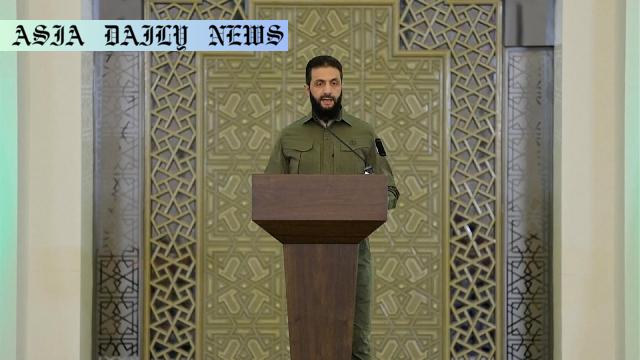Transitional Government: Ahmed al-Sharaa takes charge as Syria’s interim president with challenges of rebuilding post-conflict.
Transitional Government: Ahmed al-Sharaa has been named Syria’s president for a transitional period.
Efforts are underway to dissolve Assad’s parties and rebuild the nation.
The interim government aims to stabilize Syria and lift sanctions.
Backlash from Assad supporters and Northern clashes present challenges.

Syria Names Ahmed al-Sharaa as Interim Leader
Syria has entered a pivotal phase in its history by appointing Ahmed al-Sharaa as its interim president. This change, reported by the Syrian Arab News Agency (SANA), comes after the collapse of former President Bashar al-Assad’s government. The development marks the beginning of a challenging transitional period aimed at rebuilding the nation, which has faced over a decade of destabilizing civil war.
Formation of a Temporary Legislative Council
With al-Sharaa at the helm, the government has begun the ambitious process of nation-building. Sharaa has been entrusted with forming a temporary legislative council to oversee the transition. This council’s primary focus will be on dismantling remnants of Assad’s decades-long rule and fostering a political climate conducive to stability and development in Syria. The parties that supported the Assad regime have been officially dissolved, signaling a break from the past and the ushering in of a new political landscape.
Economic Challenges in Rebuilding Syria
One of the most significant hurdles facing the transitional government is the state of Syria’s economy. Years of war have devastated infrastructure, displaced millions of people, and left a legacy of sanctions imposed by Western nations. Rebuilding requires significant international support, and the interim government has made repeated calls for the lifting of sanctions to enable a more effective recovery. This remains a contentious issue, with many nations tying sanctions relief to progress in human rights and governance reforms.
Engaging with the International Community
As the de facto leader, Ahmed al-Sharaa has already begun engaging with international visitors, presenting Syria as a nation open to collaboration and dialogue. These efforts are crucial not just for securing aid but also for fostering political recognition of the new government. Strengthening international ties could play a pivotal role in alleviating the country’s isolation and spurring economic rejuvenation.
Political and Security Complications
The transitional government’s path is riddled with obstacles. Assad loyalists remain active and are expected to resist the new regime. This tension risks undermining efforts toward internal stability. Furthermore, ongoing clashes in northern Syria between Kurdish forces and Turkey-backed militants add another layer of complexity to the already fragile situation. Successfully navigating these tensions will be critical for ensuring long-term peace and security.
Hope and Uncertainty
While this transitional period offers hope for a new beginning, much remains uncertain. A specific timeframe for the transition has not been provided, leaving questions about the government’s long-term plans. The road ahead will undoubtedly involve setbacks, but this shift in leadership marks a moment of potential transformation for Syria. Observers around the world are watching closely, eager to see whether these efforts lead to a stable, prosperous future or falter under existing challenges.
A New Syria on the Horizon
The appointment of Ahmed al-Sharaa as interim president is a significant development in Syria’s tumultuous history. If this transitional government manages to overcome its myriad challenges, it may pave the way for a brighter future for the Syrian people. Efforts to repeal sanctions, rebuild infrastructure, and foster international cooperation will all be critical in this journey of transformation. For now, Syria stands at a crossroads—a nation battered by conflict but determined to redefine its destiny.



Commentary
Hope Amidst Challenges
The appointment of Ahmed al-Sharaa as Syria’s interim president marks a turning point for a nation that has endured over a decade of civil war. This move is undeniably laden with hope, but it also brings forth an array of challenges that will test the resilience and determination of the transitional government. The symbolic break from the Assad regime is cause for cautious optimism, but actions must follow this promising beginning to ensure enduring progress.
Rebuilding Trust and Governance
Perhaps one of the most pressing issues for the new leadership is rebuilding trust—both among Syrians and the global community. Decades of autocratic rule have left deep scars and skepticism among the populace. By dismantling the structures that propped up Assad’s regime, the transitional council is making the case for transparency and reform, though only time will tell if this is enough to inspire public confidence in the new government.
Economic Priorities Will Define Success
The economic toll of Syria’s civil war is extensive and daunting. Resolving this crisis will be crucial in establishing stability. Although the call to lift sanctions is understandable, achieving this goal will require tangible evidence of improved governance and human rights practices. At the same time, international aid must be directed specifically to areas that need urgent reconstruction to avert misuse and inefficiency.
Global Responsibility and Engagement
It is imperative that the global community engages with Syria’s transitional government constructively. While concerns over security and political stability remain valid, leaving the nation isolated could undermine its efforts to rebuild. Collaboration, not rejection, will help lift the Syrian people from the depths of despair and provide the tools they need to create a self-sufficient, peaceful state.